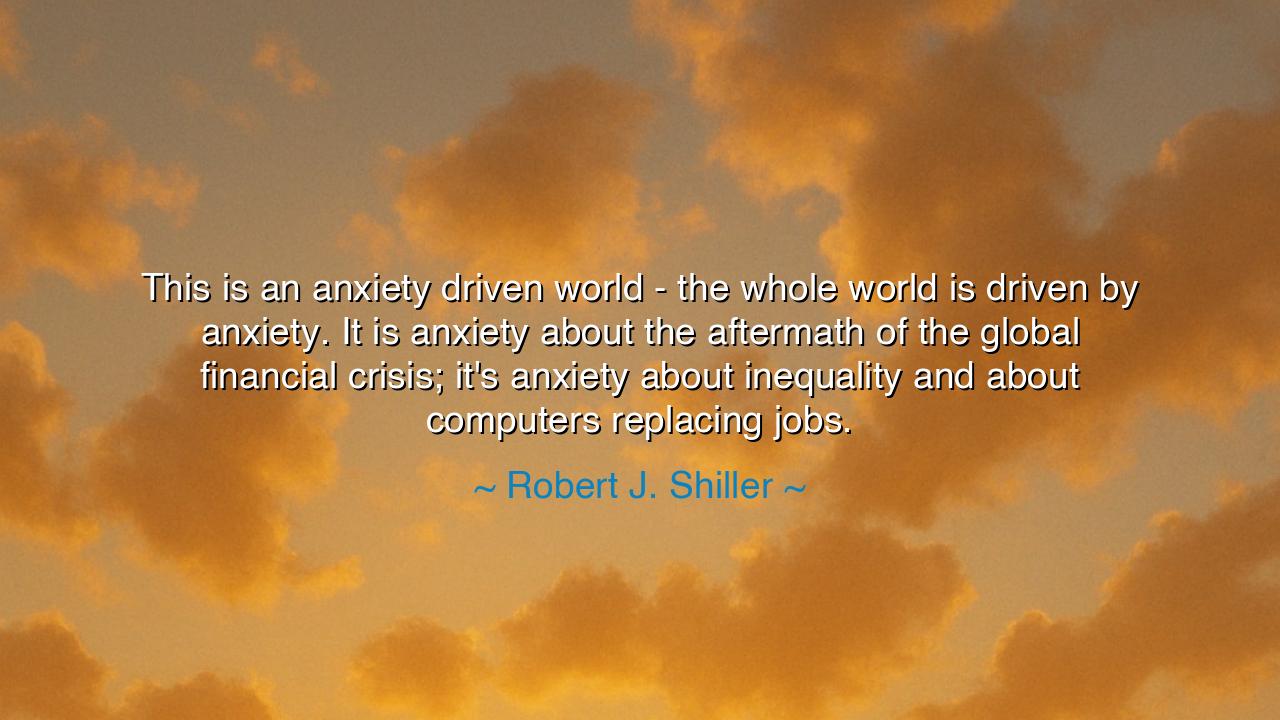
This is an anxiety driven world - the whole world is driven by
This is an anxiety driven world - the whole world is driven by anxiety. It is anxiety about the aftermath of the global financial crisis; it's anxiety about inequality and about computers replacing jobs.






The Nobel laureate Robert J. Shiller, a seer of markets and the moods that move them, once spoke words that pierce like an arrow through the veil of our age: “This is an anxiety-driven world — the whole world is driven by anxiety. It is anxiety about the aftermath of the global financial crisis; it's anxiety about inequality and about computers replacing jobs.” In these words, the wise economist does not merely describe an era of fear; he reveals a condition of the human soul—one that has traded faith for uncertainty, and calm for ceaseless striving. For in this time of light and knowledge, humanity still trembles beneath invisible chains—the chains of anxiety that bind both the rich and the poor, the worker and the ruler alike.
In the ancient world, the philosophers spoke of fear as the shadow of desire. They taught that man suffers most not from what is, but from what might be. Shiller’s words echo this timeless truth: that our age, though gilded with progress and knowledge, is haunted by worry. The global financial crisis, that great trembling of the earth’s markets in the year 2008, left not only broken banks but broken confidence. Its tremors were not confined to the towers of Wall Street, but spread into the hearts of common people—families who lost homes, workers who lost purpose, and nations who lost faith in their own stability. That anxiety lingers still, invisible but alive, whispering doubts into every act of commerce and every dream of security.
But the wise man also speaks of deeper causes—of inequality, that widening gulf between those who feast and those who hunger. For how can peace dwell in a world where the few grow ever richer while the many labor in shadow? The ancients warned that imbalance breeds unrest. The Roman Empire, mighty in its glory, began to crumble not from the swords of barbarians but from the despair of its own people. Bread grew scarce, wages fell, and hope—once the fire of the Republic—grew dim. The anxiety that Shiller describes is not unlike that of Rome’s last days: a fear that the order we built may no longer serve us, and that the fruits of progress may belong to fewer hands with each passing year.
And then there is the specter of technology—the silent conqueror. Once, man built machines to serve him; now, he fears they will replace him. Computers replacing jobs, as Shiller warns, is not merely an economic change but a spiritual one. The craftsman who once took pride in his skill now wonders if his skill has meaning. The student, dreaming of a career, fears that an algorithm will take his place before his journey even begins. It is as if we have forged gods of silicon and code—creatures of logic without mercy—and now stand uncertain before our own creation. The ancients told of Prometheus, who stole fire from heaven and was bound for his gift. Perhaps our age too bears such chains: punished not for invention, but for forgetting the balance between creation and compassion.
Yet anxiety, though heavy, is not without purpose. It is the trembling before transformation, the whisper of the soul that something must change. The wise among the ancients—those who faced plague, famine, and war—did not curse fear, but listened to it. They understood that fear can either enslave or awaken. If inequality grows, it calls for justice; if machines threaten labor, it calls for imagination; if crisis breaks confidence, it calls for renewal. The path of the courageous is not to flee anxiety, but to master it—to let it refine the spirit like iron in the forge.
Consider the story of Franklin D. Roosevelt, who led his nation through the Great Depression, when millions were jobless and hope had nearly perished. In his first speech as leader, he proclaimed, “The only thing we have to fear is fear itself.” He understood what Shiller now reminds us of: that fear can destroy a nation faster than any economic collapse. But when people face it together—with courage, compassion, and faith—they can rebuild even from ashes. Anxiety, when met with wisdom, becomes the fire that drives renewal.
Thus, let this be the lesson for our age: do not let the anxiety of the world consume your peace. See it, instead, as a signal—a call to awaken your inner strength. If the world trembles with uncertainty, anchor yourself in purpose. If technology changes your path, learn and adapt, for the human mind is still mightier than the machine. If inequality troubles your heart, let it move you to justice, not resentment. And if fear whispers of crisis, answer it with courage.
For though Shiller names this an anxious world, remember this truth passed down through all generations: every age of fear has birthed an age of renewal. The storms of the soul are not meant to break us, but to cleanse and prepare us. So stand firm, O child of the modern age, for even amid the noise of markets and machines, the ancient light of resilience still burns within you. And when you master your own anxiety, you will find that the world, too, begins to calm.






AAdministratorAdministrator
Welcome, honored guests. Please leave a comment, we will respond soon